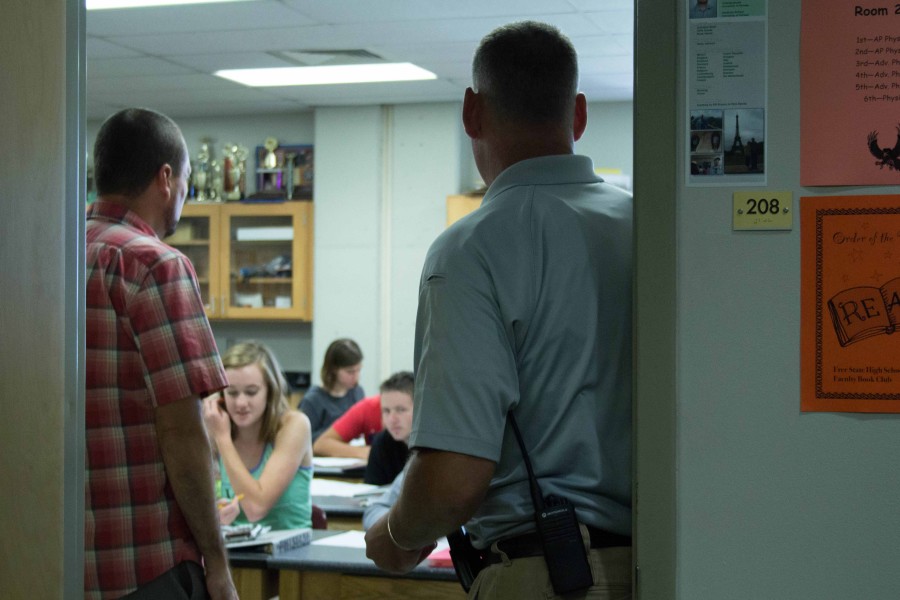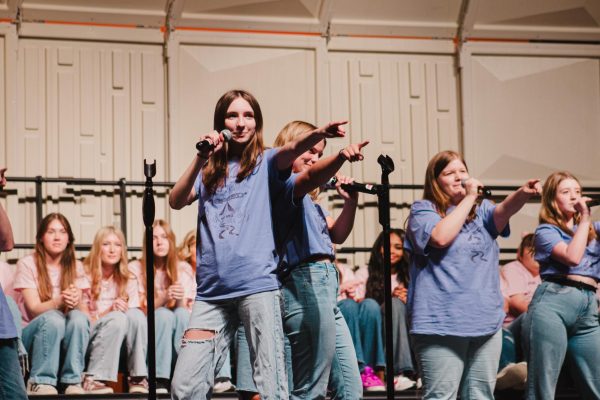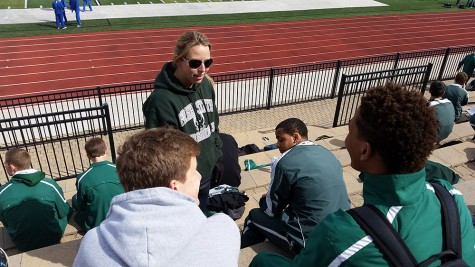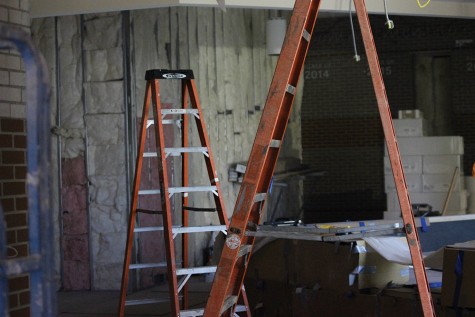Students’ rights limited on school grounds
SRO Ty Scheibler goes into a science classroom to observe.
At a Friday night home football game in October, the student section is full, with some students noticeably drunk. One takes a swig out of what appears to be a bottle filled with water. The look on her face as she drinks says otherwise.
Drinking at a school event seems risky, especially with security guards, administrators and police officers milling about. It’s not difficult to smell the alcohol coming off students’ breath. However, only the school officials can get students in trouble. This excludes student resource officers.
“I can arrest you if you’re holding it (alcohol) or have it, but once it’s in your system, there’s really nothing I can do,” SRO Ty Scheibler said.
While the 1969 Tinker v. Des Moines verdict decreed that “students don’t shed their constitutional rights at the schoolhouse gates,” in 2014, with advances in technology, gender-equality and courts, the boundaries of students’ rights are often blurred.
Social Media and Freedom of Speech
Some believe that one of their First Amendment rights, freedom of speech, allows them to say what they wish on social media without fear of retribution.
However, this is not entirely the case.
“Anything of a bullying nature or a school threat that comes along is stuff that you can get in trouble for,” associate principal Steve Heffernan said. “It doesn’t matter when or where you do it.”
Whether students post on social media during school or at home, depending on the nature, the school can reprimand students for the content. Senior Alder Cromwell disagrees with this policy.
“I don’t really feel like they have much of a right to dictate the things we do outside of school,” Cromwell said.
Additionally, students have no right to privacy on school computers. Under the Child Internet Protection Act, the school district must filter the Internet system and monitor for potentially inappropriate activity. This applies to both staff and students using the district Internet. The district may prevent access to certain websites.
“Not allowing us on Youtube and social media—I think that’s pretty overbearing,” sophomore Sabrea Platz said.
If a student or faculty member uses the Internet system inappropriately, then USD 497 investigates the issue and responds accordingly. The district considers the use of its computers a privilege, not a right, and can revoke access at any time.
“One must distinguish between rights and privileges,” said David Cunningham, director of human resources and legal services for the district. “…there are certain rules and regulations that you must follow.”
In 1969, the Supreme Court ruled in Tinker v. Des Moines that if the school district could not provide substantial evidence that the speech was causing a disruption, then, under the First Amendment, the speech was protected.
This court decision still stands to some degree. The First Amendment still protects students, however to a lesser extent based on recent Supreme Court cases. While students are entitled to their own opinions, if these cause a disruption in the classroom, the school can interfere.
“The ability to maintain an educational environment in that case would supercede the individual’s free speech rights,” Cunningham said.
Some students see these policies as overly harsh, making it possible for the administration to abuse their authority.
“I feel the school is intended to teach us how to think, but in the recent years, the administration has tried to teach people what to think as opposed to how,” senior Isaac March said.
Searches of Property/Students
When law enforcement conducts a search, they must have probable cause, and, in most cases, a warrant. However, if the administration wants to search a student, locker, car, backpack, etc., all they need is reasonable suspicion that “district policies, rules or directives are being violated.”
Because reasonable suspicion is much less than probable cause, it is much easier for the administration to conduct a search of a student or property.
“If you come in and you say, ‘Ty, see that girl over there? I’m pretty sure that she was talking about having drugs in her locker,’ (then) that’s enough reasonable suspicion for Mr. (Ed) West to search her backpack, her locker, anything,” Scheibler said.
The principal conducting the search must tell the student why he or she is being searched and try to contact the student’s parent. In most searches the SROs are present. If a student refuses to cooperate, the principal can ask law enforcement for assistance.
Searches of property like lockers and cars follow similar guidelines. However, lockers are subject to random searches, and the principal does not have to give notice of a search.
The student handbook states that “students shall have no expectation of privacy in any school locker.”
For March, this is expected.
“You shouldn’t bring anything there that you wouldn’t take on an airplane,” March said. “I feel that people are entitled to the privacy of their car and, to a certain extent, their backpacks, but your locker is fair game.”
Likewise, if a car is on school property, the administration has the right to search it.
“On the campus, the Free State campus, your student rights are severely hinged just by the fact that you are on school property,” said John Frydman, a criminal defense lawyer. “They don’t need to have probable cause to search your lockers or your property because of safety concerns that are different than in your home.”
While the administration can easily search a locker or a student’s property, law enforcement must have a search warrant to do so. The principal must also give permission and be present for the search.
The Fourth Amendment states: “The right of the people to be secure in their persons, houses, papers and effects, against unreasonable searches and seizures, shall not be violated, and no warrants shall issue, but upon probable cause, supported by oath or affirmation, and particularly describing the place to be searched, and the persons or things to be seized.”
It may seem like the school’s policies violate students’ Fourth Amendment rights. However, in the 1985 New Jersey v. T.L.O. case, the Supreme Court ruled that students should have lowered expectations of privacy in school, and that allows administrators to search without probable cause.
Bullying
Bullying, along with hazing, is strictly prohibited according to district policy. While bullying can be subjective, the student handbook provides a description: “Including, but not limited to derogatory comments, jokes, slurs, spitting or remarks or questions of a harassing or intimidating nature.”
According to the Youth Risk Behavior Surveillance System, in 2013, nearly 20 percent of high school students experienced bullying.The district takes bullying seriously, but it can be hard to identify.
“So, how do you define what’s harassment? It’s kind of decided by the person receiving it,” Heffernan said.
Because bullying is often subjective, the district evaluates each situation on a case-by-case basis. Most of the time the victim decides what is bullying. But the district can also take action if it feels the situation is inappropriate. The person involved doesn’t necessarily need to feel bullied.
School district officials say hazing is more of a disruption in class than bullying. Hazing is defined in the handbook as, “any activity expected of a member of a group that humiliates, degrades, abuses, endangers or risks physical or emotional harm regardless of the person’s willingness to participate.”
When boys get their heads shaved during senior week and are sent home, it is often because the administration considers such an act hazing and a class disruption.
Law enforcement officers are limited in what they can do when it comes to bullying—the school district has more bite in that respect. Law enforcement or SROs will often be brought in when a threat is involved.
“Criminal threats—if kids are like, ‘I’m going to kill you’—I can act on those,” Scheibler said.
But milder forms of abuse are more difficult and complex to address, causing many to go unreported.
Discrimination
According to Title VI and Title IX, schools officials can not discriminate against students based on sex, color, race or national origin.
Discrimination against a person because of their disability, religion, sexual orientation or gender identity is also banned. The same guidelines apply to harassment.
The district investigates all reports of discrimination and harassment and may take disciplinary actions based on the result. This may including job termination or expulsion from school.
If a student feels discriminated against or harassed, they should report the incident to the superintendent.
Grade Posting
According to the Family Educational Rights and Privacy Act (FERPA),schools must have written permission to release a student’s grades.
“We publish honor roll,” Cunningham said. “That’s one of those areas that evolved a little bit. There were some cases that said that would be a violation of FERPA.”
Honor roll differs from general grade posting because it does not reveal a student’s actual grade. It is considered directory information that the district may release unless a student tells them otherwise.
FERPA also allows students to grade each other’s work as long as the instructor has not already evaluated the assignment.
Additionally, teachers may show examples of student work as long as they do not name the student.
FERPA restricts many grade-related issues. For example, teachers are not allowed to leave graded work where students can see it. They also cannot talk to other teachers about a student unless necessary.
Police Rights
Compared to rights within school, students have more rights with the police. Police must follow Constitutional guidelines, while the courts have ruled that schools don’t in order to maintain a safe environment.
“I think most kids don’t realize that they probably have less rights in school through the administration than what they have with law enforcement,” Scheibler said.
However, encounters with police may be more intimidating than with school administrators. It’s important for students to know their Miranda rights from the start, rather than wait until they get arrested.
Miranda rights help protect citizens’ Fifth Amendment right, the right not to answer incriminating questions. This includes the right to remain silent and speak only with an attorney present.
“You have absolutely no obligation to talk to the police at all,” Frydman said. “You have to give them your name sometimes and your driver’s license if you’re driving, but you don’t have to submit to any tests, (and) you don’t have to consent to any searches. You don’t have to answer any questions like, ‘Where are you going?’ ‘Where have you been?’”
Remaining silent may be the best measure to keep students out of trouble if they are found in a criminal situation.
“I very rarely see a student or a person who helps themselves by talking to the police,” Frydman said. “Generally, it does not get better if you talk.”
Conclusion
From classic problems such as underage drinking and drug use to new issues like misuse of social media, students need to be aware of their rights and possible alterations to prevent abuse. A balance between the administration and students is key to protecting students’ rights.
“I think there should be some level of trust between us,” Platz said.
Your donation will support the student journalists of Lawrence Free State High School. Your contribution will allow us to purchase equipment and cover our annual website hosting costs.











Connor • Aug 28, 2018 at 9:13 am
This thing is too long